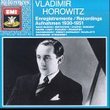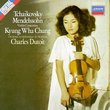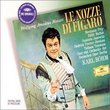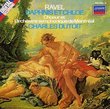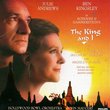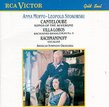| All Artists: Jules Massenet, Bernard Keefe, BBC Philharmonic Orchestra, Alexander Oliver, Bernard Dickerson, George MacPherson, Jenny Hill, Laura Sarti, Milla Andrew, Nelson Taylor Title: Massenet: Sapho Members Wishing: 0 Total Copies: 0 Label: Opera D'oro Release Date: 10/5/2004 Genre: Classical Style: Opera & Classical Vocal Number of Discs: 2 SwapaCD Credits: 2 UPC: 723721011055 |
Search - Jules Massenet, Bernard Keefe, BBC Philharmonic Orchestra :: Massenet: Sapho
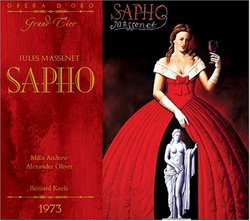 | Jules Massenet, Bernard Keefe, BBC Philharmonic Orchestra Massenet: Sapho Genre: Classical
|
Larger Image |
CD DetailsSimilarly Requested CDs
|
CD ReviewsA Rare Massenet Opera Steven Muni | Sutter Creek, CA USA | 03/07/2008 (4 out of 5 stars) "For years opera critics looked down their noses at French Romantic opera, deeming it shallow, sentimental and simply a soprano showcase. Fortunately, thanks to stars like Beverley Sills and Renee Fleming, French Romantic opera is now beginning to get the respect it deserves.
Jules Massenet was one of the giants of French Romantic opera, with a dozen major operas to his credit, including "Le Roi de Lahore" (1877), "Herodiade" (1881), "Manon" (1884), "Le Cid" (1885), "Esclaramonde" (1889), "Werther" (1892), "Thais" (1894), the one-act "La Navarraise" (1894), "Sahpo" (1897), "Cendrillon" (1899), "Cherubin" (1905) and finally "Don Quichotte" (1910). Although chronologically speaking "Sahpo" falls in the middle of his career, the music is far more modern in feel than all of Massenet's other operas, including his later ones. In this opera, more than in any of his other ones, the music serves the text and the orchestration is not as lush nor the solos so spectacular as in his other operas. (Massenet, like his contemporary Puccini, was famous for writing for his sopranos.) It is also his most "verissmo" opera. This Sahpo is not the ancient Greek poetess of the Isle of Lesbos, (the subject of Gounod's opera of the same name), but rather Fanny Legrande, an artist's model and artist's lover in 19th century Paris, and the subject of a semi-autobiographical novel by Alphonse Daudet. Originally written for soprano Emma Calve, the opera enjoyed wide international success. American soprano Mary Garden brought the opera to New York and Chicago in 1909, but after that it languished in this country until a New York concert version in 1979, featuring Elisabeth Soderstrom in the title role. This version is a 1973 BBC studio broadcast, starring the Canadian-born soprano Ludmilla Andrew, (primarily known in England.) The male lead is sung by Scottish tenor Alexander Oliver. The story is reminiscent of "La Traviata", only nobody dies. Actually it's closer to Puccini's "La Rondine". In Act I, at a party at the salon of a noted sculptor, Fanny, an artist's model of notorious reputation meets Jean, a wealthy youth up from the country, is quite taken by the boy, and persuades him to leave with her. In Act II, Jean's parents have set him up in an apartment in Paris to study. With them is their neice Irene, whom they mean to adopt. Irene and Jean have a nice little duet, remembering their happy childhood together. When the parents and Irene leave, Fanny shows up, intending to resume the affair, and Jean falls back in love with her. In Act III, Jean and Fanny are still together a year later, sitting at a restaurant. The sculptor, the host of the party where they first met, arrives with friends. When Fanny leaves (presumably to powder her nose), the sculptor tells Jean about Fanny's former lovers. Jean is horrified, and when Fanny comes back, Jean rushes away. Back at their apartment, Jean is packing his bags when Fanny enters and begs him to stay, assuring him she is no longer the Fanny of old. But Jean finds some old letters of Fanny that indicate that she has a child by one of her former lovers, who's presently in jail, and a furious argument ensues, with Fanny telling Jean to go back to Mommy and Daddy. In Act IV, Jean is back at home with his parents and miserable, missing Fanny. He confesses as much to his mother. His cousin Irene hints at her feelings for Jean, but Fanny shows up, asking Jean to come back. He almost does, but Fanny is ordered out of the house by Jean's mother and Jean remains at home. In Act V, Fanny is back at the apartment she shared with Jean, Fanny fondly recalls their time together, but realizes that her place is with her little son. (Who knows where he's been all this time? That poor kid is going to have some serious abandonment issues!) Jean rushes in declaring he has left his family for Fanny, and the lovers embrace. But Jean, exhasted from his travels (and all this drama) falls asleep and kissing him gently and whispering a final farewell, Fanny leaves and closes the door. Alright, so it's not Shakespeare. Nor is it one of Massenet's great operas, like "Manon", "Werther", or my favorite, "Thais". But it's still quite good and deserves better treatment. This production is well sung and the sound quality is fine. (Opera d'Oro has always been hit or miss in sound quality, but their new series, Opera d'Oro Grand Tier, is usually pretty good.) There is an excellent booklet, with a libretto and a fine introductory article. While not a 5-star production, this opera belongs in any good collection. " |

 Track Listings (14) - Disc #1
Track Listings (14) - Disc #1